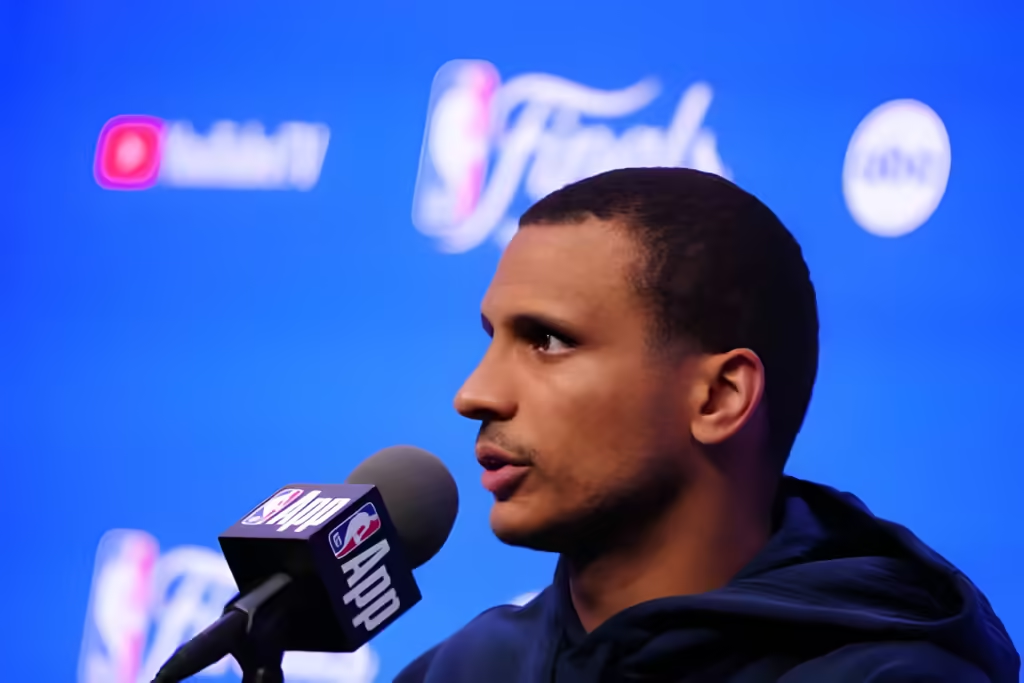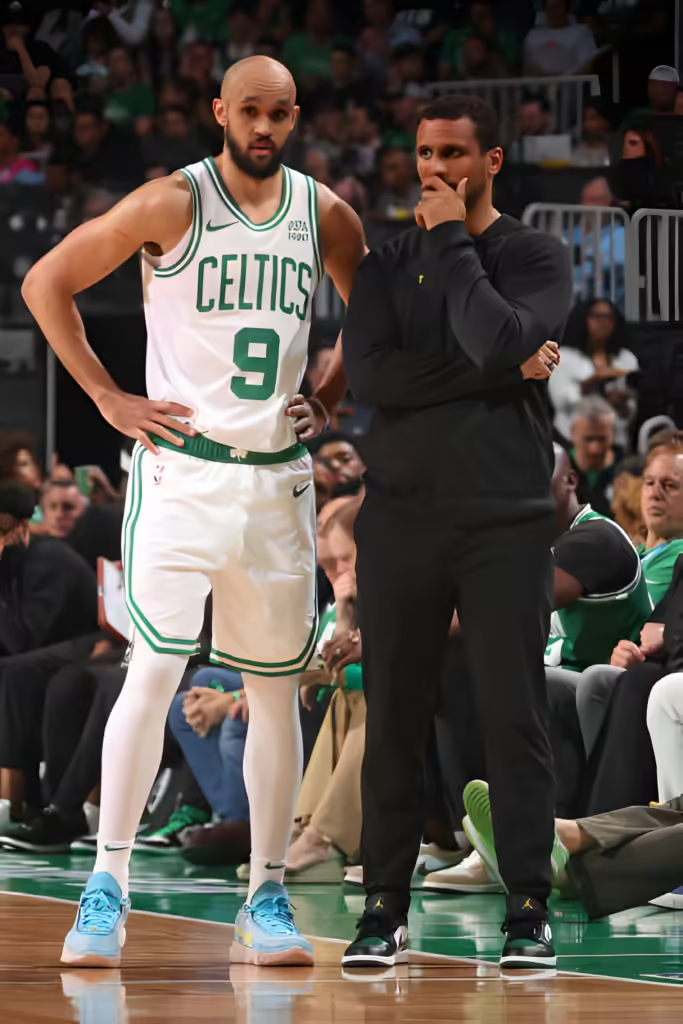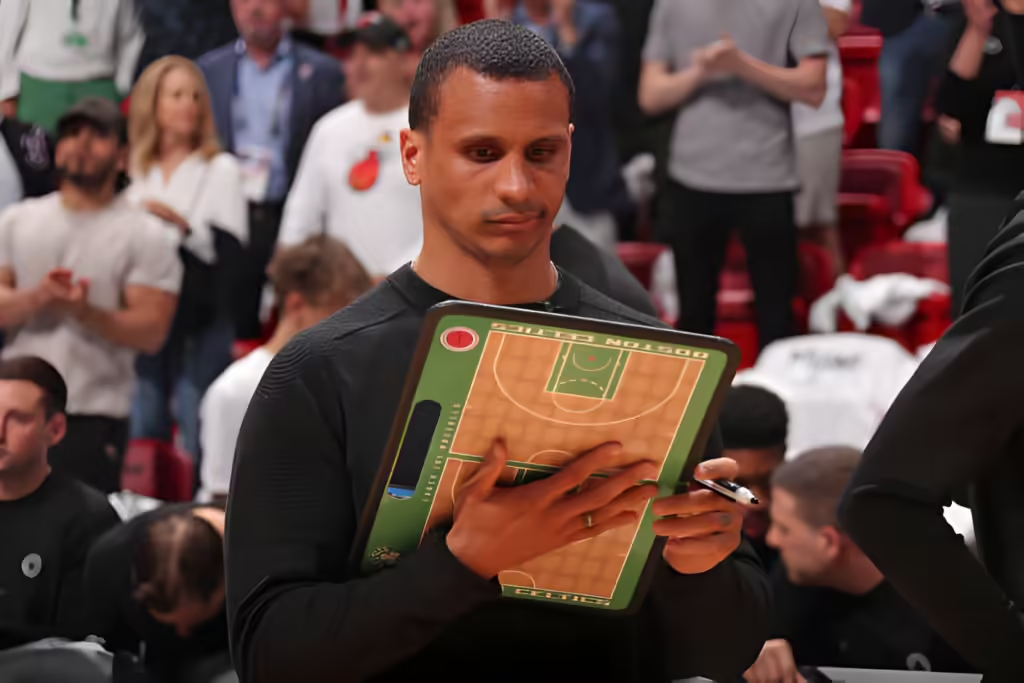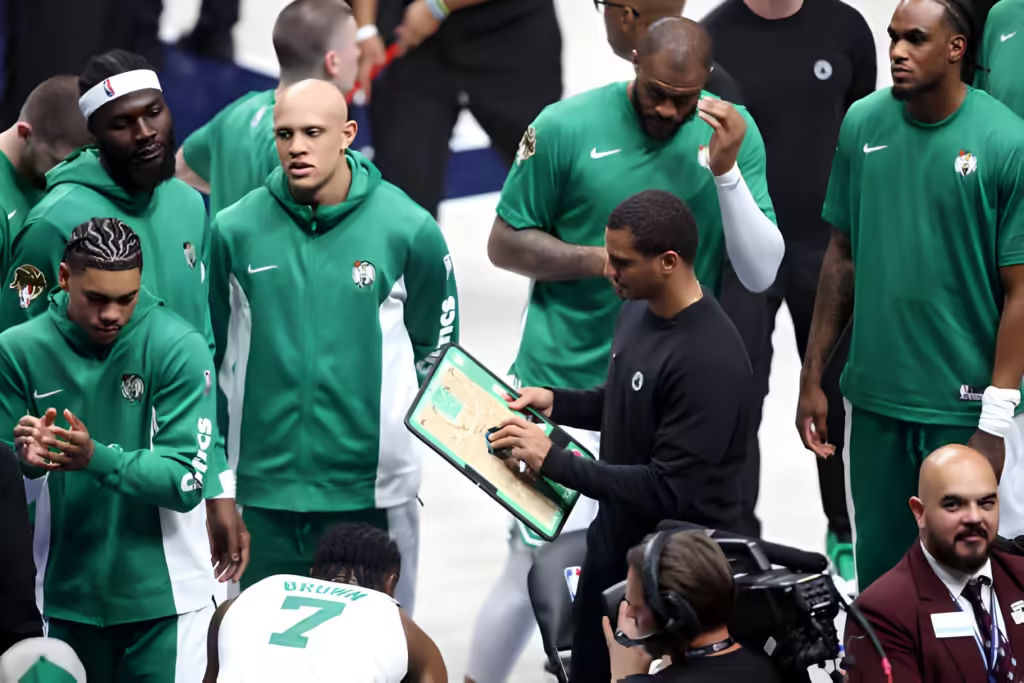The Unorthodox Coach: Joe Mazzulla and the Boston Celtics’ Journey to the Finals
Joe Mazzulla may be the NBA’s youngest and most atypical coach. People have teased him for his unusual remarks and distinctive techniques. Yet, as the Boston Celtics edge towards their first championship in over a decade and a half, it’s clear that his unusual approach works.
When Mazzulla speaks with journalists, his gaze swiftly shifts from one side to another, like he’s spotting getaway routes. His recalls of game strategies are as fast as an Alexa on hyper-speed, and his followers made AI-forged statements that mirror his actual sayings. He’s into The Town, imagines swindling Fenway Park, and borrows strategies from soccer coaches. He savors squandered leads and wet weather and believes getting jeered at is a “character-building” experience.
Mazzulla uses a peculiar but effective method to guide the Celtics in their game strategy. He cleverly incorporates footage of orcas hunting in groups and taking turns to submerge their prey into his training videos. It’s an odd choice, yet it has been instrumental in fostering the Celtics’ group superiority during playoff season.
In the previous season, Mazzulla found himself a sudden choice as the Celtics’ acting head coach preceding their training camp. His peculiar ways made for interesting and even funny moments but also invited ridicule when they fell flat. Despite losing to the Miami Heat in the Eastern Conference finals, he reasserted his standpoint. Mistakes were not in his plan, but how he carried it out. “My teaching failed,” Mazzulla admitted. “I didn’t set my team up for the greatest success. I need to really step up my training.”

The Celtics’ backup center, Luke Kornet, acknowledges Mazzulla’s unwavering belief in his values. Kornet states, “When you understand who you’re ultimately answerable to and what your heart guides you to do, behaving in another manner comes off as dishonest. Mazzulla stands firm on this.”
Mazzulla loves soccer and models his philosophy after it. He imagines a Celtics team that adjusts swiftly on the court like soccer players do. The ball moves dynamically across the field, players recognizing their opponent’s strategies and countering. Mazzulla knows that the real action isn’t just in the key moments or major turnovers. When the ball’s in play, coaches have less control than most people think. His vision stems from his passion for soccer and a broader understanding of the game’s nature.
The Celtics’ management reinforced Mazzulla’s plan. They swapped team motivator Marcus Smart for Kristaps Porzingis, who’s even better than Al Horford at extending the playing area. The management also brought in Jrue Holiday. He’s great at both offense and defense can fill different roles, and truly is basketball’s equal to a soccer midfielder. He fits right into Mazzulla’s vision.
Boston has taken more three-pointers this year than the last; they also improved in grabbing more rebounds from their missed attempts, creating opportunities for second chance points. They even leveraged the 3-pointer to cut down on lost possessions. Imagine this scene that may exasperate spectators and trainers: Tatum, pitted against a big player, opts not to drive to the basket but to attempt a three-pointer–a shot he’s only been successful 27.9 percent of this season–and lucks out because his colleague came to the rescue. Yet, in Mazzulla’s strategy, using a strong guard like Holiday positioned to recover from the corner is a well-calculated risk. It’s akin to kicking the ball downfield, hoping your offensive teammate gains control, and providing a buffer to arrange your defense should the ball possession shift.

Let’s consider what Mazzulla reflects on. It’s about both the events that took place and those that didn’t. Imagine a driving layup. It could’ve made the Celtics’ defense susceptible during the transition. Worse still, it could’ve resulted in a live-ball turnover. Teams going hard for rebounds often surrender many swift counterattack opportunities. Yet, this season had Boston as one unique team. They were one of just four teams who ranked in the top 10 for offensive rebounds and defending against fast breaks.
It’s an interesting mind game at play here; Mazzulla stands up for his top player in public, while behind closed doors, he fine-tunes a strategy that transforms Tatum’s shortcomings into advantages—or at least cuts down the bad influence they could have.
The Celtics, contending with a somewhat weakened Eastern Conference, pushed against Mazzulla’s concepts. However, they also had their share of challenges: Porziņģis was part of only six games. Boston’s accurate shooters didn’t shine in Game 2 versus the Mavericks. Tatum’s shooting performance from the arc throughout the playoffs was less than average, under 30 percent. By the middle of Game 2 on Sunday, it seemed like Dončić had cracked Boston’s pick-and-roll strategy. In Game 3, Boston nearly fumbled a hefty 21-point lead in the final quarter. Derrick White thinks Mazzulla might have enjoyed the stress of it all. “He’s a sicko,” he mentioned.
The Celtics are on the verge of victory, regardless of their stumbles or poor aim. Because of a robust, self-adjusting setup that supported them despite their faults, they are a single win from the championship. Simple stats for understanding: In the series’ initial three matches, the Celtics have attempted 127 three-point shots. Dallas merely tried 78 times. The Celtics haven’t been impeccable, but they’ve certainly not been delicate, showing resilience in the face of the unpredictability their method demands.

Mazzulla’s love for cinema shapes his strategy. He uses iMovie to make game film sessions that hold his team’s attention. For example, an early playoff Celtics session started with a UFC fighter’s clip. It showed the fighter being hit low, complaining, and then getting knocked out the next round. This served to remind the team, who had an excellent regular season, not to lose concentration. He emphasizes that the nearer one is to victory, the easier it is to lose focus. It’s easy to look forward, to be disturbed by uncontrolled factors. Overconfidence can sneak in. The opponent, bitten by defeat, gathers strength for one final try.
During the press conference following Game 3, The Athletic’s Jared Weiss noticed that Mazzulla adopted a no-timeout strategy, reflecting his fondness for soccer. This left him seemingly unsure when rivals launched massive rebounds. His desire was for the Celtics to be able to tackle issues in real-time, like soccer players, despite the frequent pauses and player changes inherent to basketball caused by its more strategic nature. Mazzulla’s stubbornness in sticking to the 3-pointer strategy, rather than the creative thinking seen in successful outcomes, contributed to his image as an obstinate nerd.
“Mazzulla’s approach has matured. He realizes that regardless of our obsession with key timeout and the significant strategy shift when the ball is in the air, the coach isn’t as influential as the stories surrounding the profession suggest. His broad understanding of what is ideal for our group and what is crucial gets highlighted, acknowledging his role with humbleness, realizing his influence isn’t the world’s most potent thing,” Kornet puts forward. “The tools at hand for a coach often seem like timeouts, and they can take advantage, but also realizing maybe my duty is getting my guys ready so we can withstand [runs].”
The Celtics’ knack for adaptability has been key in their playoff progress; their rugged style which embraces uncertainty, continues to see them triumphant. Under Mazzulla’s guidance, they rely on data and believe in their strategy, even if things go haywire.

Ultimately, it’s not the peculiarities or unconventional ways that count. It’s the outcome. The outcome shouts it all. The Celtics stand at the threshold of their first championship in 16 years, all credited to Joe Mazzulla’s offbeat coaching approach.

Comments are closed